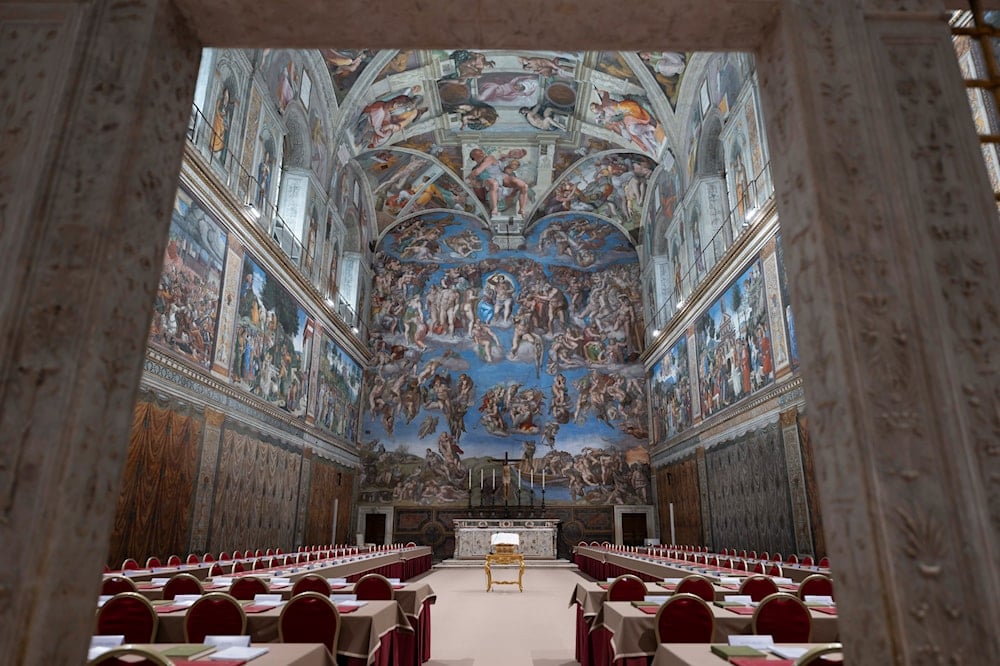Cardinals begin choosing new pope in largest ever conclave
The 2025 papal conclave begins under Michelangelo’s frescoes as 133 Catholic cardinals cast votes for the next pope after Francis.
-

A view of the Sistine Chapel where cardinals gather to elect the new pope, at the Vatican, on May 6, 2025. (Vatican Media via AP)
The 2025 papal conclave officially begins Wednesday afternoon, as 133 Catholic cardinals from across the globe gather beneath Michelangelo’s The Last Judgment in the Sistine Chapel to elect the next pope after Francis.
This marks not only the largest, but potentially the most unpredictable conclave in modern Catholic history.
The cardinals, who have met daily since April 28 for pre-conclave discussions, are now secluded in Casa Santa Maria, must leave their mobile phones, and are barred from outside communication until a new pontiff is chosen.
Their only movement is the bus ride to and from the Sistine Chapel, where two rounds of secret ballots will be held every day.
As tradition dictates, smoke signals will indicate the outcome of each session: black for no result, white when a new pope is chosen. If no decision is reached after three days, the cardinals will pause for reflection before resuming the voting.
It is worth highlighting that one of Pope Francis’s enduring legacies was the creation of a diverse but divided College of Cardinals. Some members align with the progressive agenda he championed, while others advocate for a more conservative return to tradition.
“There’s a lot of confusion,” said Ignatius Suharyo Hardjoatmodjo, Archbishop of Jakarta, who arrived late to Rome and is catching up with the debate. “We have heard many voices, it’s not easy to draw conclusions.”
The challenge of electing a leader capable of navigating a fragmented Church while addressing a crisis in global order has left many uncertain about the outcome.
Who will be the next pope after Francis?
Speculation surrounding the papal candidates for 2025 has only intensified following Pope Francis’s death at age 88 last month. The list of potential successors grows by the day, with more than 20 names circulating in Vatican corridors.
Among the frontrunners is Robert Prevost, a US cardinal described as a thoughtful moderate with a “keen capacity to listen.” Prevost’s rise has somewhat eclipsed Pietro Parolin, the Vatican’s secretary of state, whose reputation as a skilled diplomat is countered by critics who see him as uninspiring.
After the death of #PopeFrancis, the #Vatican is preparing to choose his successor.
— Al Mayadeen English (@MayadeenEnglish) April 22, 2025
Several Cardinals are believed to have the highest chances of becoming the next Pope.
Which Cardinal do you think will be the one to bring the white smoke?#PopeFrancisDeath pic.twitter.com/Mjiu2NLMlU
Another high-profile candidate is Luis Antonio Tagle of the Philippines, dubbed “the Asian Francis,” though his record on clerical abuse cases has drawn criticism. Other progressives in the mix include Matteo Zuppi, Jean-Claude Hollerich, Timothy Radcliffe, Michael Czerny, and Pierbattista Pizzaballa, the latter known for his peace work in occupied al-Quds.
On the traditionalist side are Péter Erdő of Hungary and Robert Sarah of Guinea, the latter a vocal critic of Francis’s papacy. Also backing a conservative shift are Raymond Burke, a Trump-aligned US bishop, and Gerhard Müller of Germany, who warned of potential schism if an orthodox pope is not chosen.
Calls for unity in the Catholic Church
Despite differing views, cardinals appear united in their belief that the new pontiff must help restore Catholic Church unity. One Vatican official noted the collective desire for a pope who can be “a bridge and a guide for a disorientated humanity.”
“The one thing they can agree on, whether they are far left or far right, is that they all want more involvement in the government of the next pope,” said Andrea Vreede, Vatican correspondent for Dutch public broadcaster NOS.
The conclave is expected to be swift, possibly lasting only three to four days. According to Severina Bartonitschek of Catholic news agency KNA, the key responsibility awaiting the next pontiff is to unify the Church and confront internal crises, particularly clerical abuse cases.

 4 Min Read
4 Min Read








